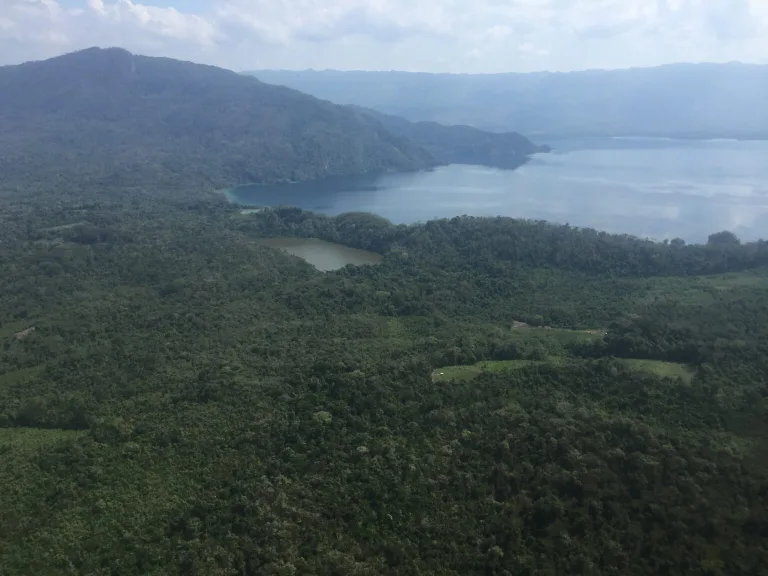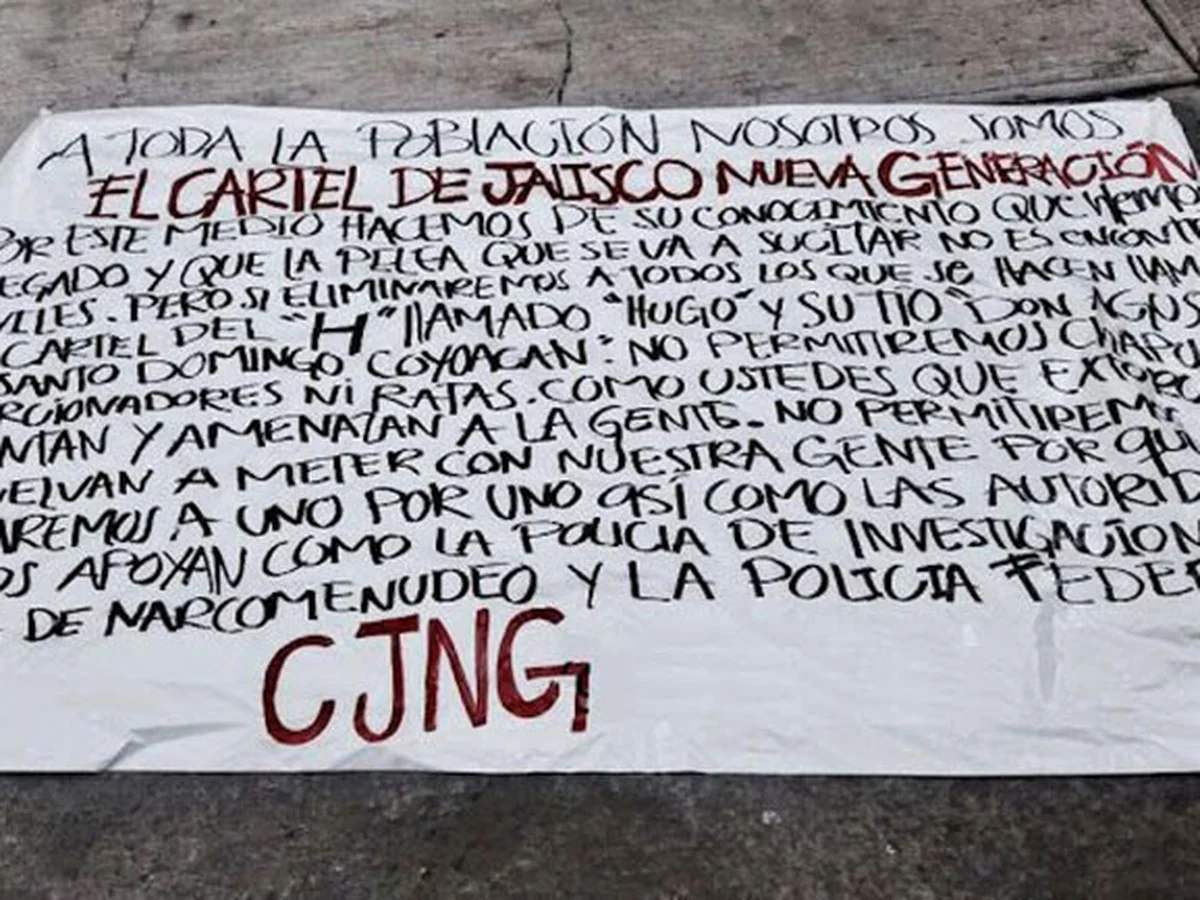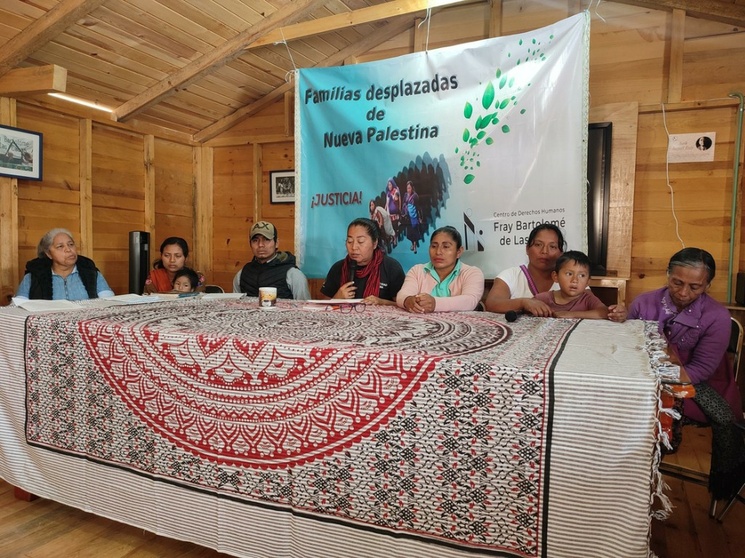Luis Hernández Navarro
The San Javier crossing, on the Palenque-Trinitaria highway, is a strategic point in the ancient Desierto de la Soledad (Desert of Solitude). It is the crossroads of the communities that make up the Lacandon community: Frontera Corozal, Lacanjá and Nueva Palestina, where Choles, Lacandones and Tseltales live. The crossroads is, symbolically, the headquarters of the communal property commission. It is also the location of the indigenous prosecutor’s office and the municipal police.
As part of their strategy to take over the territory, a command unit of the Jalisco Cartel – New Generation (CJNG) took control of the place and began to charge right of way. Every vehicle crossing must pay a fee. The police were stripped of their uniforms.
To move a shipment of sugar, the community of Nueva Palestina hired a truck driver who is a member of Pueblos Unidos en Defensa de los Usos y Costumbres (Paduc), an association of more than a thousand vehicle owners to move people and merchandise in the jungle. They organized themselves to confront extortion by organized crime. In their vans and trucks they carry walkie-talkies to provide help in emergencies.
When the narco checkpoint stopped the sweetener transport, the driver refused to pay the demanded fee and alerted his Paduc associates in Nueva Palestina. He claimed that the merchandise was not his. The criminals, in addition to beating him savagely, engraved on his back with a sharp-edged weapon the initials: CJNG.
Six of the driver’s companions arrived to support him but were subdued with high caliber weapons. Inside the prosecutor’s office, they kidnapped and tortured them, pulling out their fingernails. They tried to disappear them, but a crowd, with machetes and weapons, arrived to rescue them. The criminals fled, probably to the municipality of Benemérito de las Américas, where they have had a base of operations for years.
So that there would be no doubt as to their intentions, they distributed a notice entitled “Anden con cuidado, raza” (Be careful, people). There they warn that the Jalisco Cartel – New Generation has arrived and establish a curfew from 11:00 p.m. onwards. They threaten to torture, kill and dismember the “fucking rats that we have already located (sic).” They prohibit the use of pick-up trucks with tinted windows (very common in the area) and announce a total clean-up, especially of crystal meth dealers and consumers.
What happened at the San Javier intersection is just a sample of what is happening in the region. On July 22, 18 Chol families from Rancheria Corazal were evicted from their land by criminals. They took refuge in the community of Salvador Allende, on the border with the town of Amador Hernandez. On August 28 they did the same with 34 families from San Gregorio, who took refuge in Ocosingo. There is a strategic airstrip there and it is also the route to reach the impressive waterfalls of the Negro River and an unexplored archeological zone.
On September 6, the authorities of Nueva Palestina sent a letter to President López Obrador denouncing the aggressions they are experiencing at the hands of a commando linked to Mayo Zambada’s Sinaloa cartel. The day before, the assassins entered the community commissioner’s offices, assaulted members of the rural police and announced that they would take control of the town.
It is no exaggeration to say that the Lacandon territory has been invaded by organized crime. It has taken over its jungle. Narcos have opened clandestine airstrips for cocaine transshipment. They control the trafficking of undocumented immigrants. They charge small shopkeepers and tourist service providers extortion fees. They carry out forced evictions of hundreds of families. Death threats against community leaders. They enslave young Central American girls for prostitution. Simultaneously, the northern culture -as it is known in the region-, with its corridos tumbados and narcocorridos, flourishes in the towns, while the consumption of crystal meth, marijuana and crack spreads. Gangs of boys have emerged, wearing colorful bandanas as badges.
On August 7, more than 3,000 residents of Nueva Palestina, with handmade signs on cardboard, demanded “Cartels out! and No more polleros (smugglers).” They walked 3 kilometers, denouncing the derecho de piso (extorsion fees). On September 8, the people of Frontera Corozal marched peacefully against organized crime and to demand security. Their uncovered banner read: “Mr. President of the Republic: we demand security in the Lacandon zone, particularly in Frontera Corozal.”
Since 2008, in an effort to achieve peace and security, and leave behind the shadow of the Viejo Velasco massacre, the Lacandon community has carried out an intensive and incessant work of dialogue and reconciliation with the 52 surrounding ejidos. The signing of a decree of territorial reordering and promulgation that would create conditions to reestablish new bases of coexistence in the zone is pending. The war of the cartels against the inhabitants of the jungle is a blow to the hornet’s nest of inter-community conflicts that derails the possibility of peaceful coexistence.
Organized crime is advancing in the Lacandon community. It seeks to take over the territory, recruit young people, disarticulate the community fabric and tighten the siege on the peoples in rebellion. The warning lights are lit.
Original text published in La Jornada on September 12, 2023. https://www.jornada.com.mx/2023/09/12/opinion/023a1pol
English translation by Schools for Chiapas.



